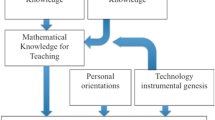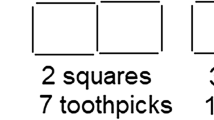Abstract
Practices within research mathematics can and do serve as models for mathematics education. However, typically such inspirations impose a devastating narrowness in relation to reflections on mathematics. This narrowness I refer to as the “banality of mathematical expertise”. Reflections on mathematics can be expressed through a philosophy of mathematics that goes beyond the traditional emphasis on ontological and epistemological dimensions, to become four-dimensional by also addressing social and ethical issues. Many working philosophies of mathematics operate within a narrow scope of reflections, seemingly located within an ethical vacuum. The consequence is a cultivation of a banality, manifest in many university studies in mathematics as well as in dominant research paradigms in mathematics. This constitutes a serious limitation in providing models for mathematics education. By contrast, there exist examples of practices of mathematics education that demonstrate a richness of reflections on mathematics. Accordingly, I address the extent to which such practices of critical mathematics education could serve as models for research mathematics and mathematics education at the university level.
Similar content being viewed by others
Notes
For a discussion of the diversity of mathematical practices, see Ferreirós (2016).
In this short summary of Burton’s research, I also drawn on conversations I have had with her.
A detailed discussion of the historicity of mathematics is found in work by Grabiner (1986), raising the question: Is mathematical truth time-dependent?
A systematics exploration of the ethical dimension of a philosophy of mathematics is found in Part IV in Ravn and Skovsmose (2019).
See, for instance, Ayer (1959).
See Ethics in Mathematics https://en.wikipedia.org/wiki/Ethics_in_mathematics. Accessed 17 February 2020.
For a discussion of such phenomena see Chapter 15 ‘Symbolic Power, Robotting, and Surveiling’, and Chapter 17 ‘Mathematics as Part of Technology’ in Skovsmose (2014).
See Skovsmose (2019).
Naturally, I am not claiming that the only content that ethical reflections on mathematics could have is rooted in the mathematics in action. The scope of ethical reflections could be much broader.
Naturally, one finds exceptions. Problem orientation and project-based education can be found in university mathematics education (see, for instance, Vithal et al. (1995). In such an educational format, one gets possibilities for reflecting on mathematics in action.
In Philosophy of Mathematics Education Journal, edited by Ernest, one finds an even broader variety of issues addressed. See also Ernest et al. (2016).
See McKenzie (2007).
References
Alrø, H., Ravn, O., & Valero, P. (Eds.). (2010). Critical mathematics education: Past, present, and future. Rotterdam: Sense Publishers.
Arendt, H. (1977). Eichmann in Jerusalem: A report on the banality of evil. New York: Penguin Books.
Avci, B. (2019). Critical mathematics education: Can democratic mathematics education survive under neoliberal regime?. Leiden, Boston: Brill, Sense.
Ayer, A. J. (Ed.). (1959). Logical positivism. New York: The Free Press.
Barwell, R. (2013). The mathematical formatting of climate change: Critical mathematics education and post-normal science. Research in Mathematics Education, 15(1), 1–16. https://doi.org/10.1080/14794802.2012.756633.
Barwell, R. (2018). Some thoughts on a mathematics education for environmental sustainability. In P. Ernest (Ed.), The philosophy of mathematics education today (pp. 144–160). Springer: Cham.
Bernacerraf, P., & Putnam, H. (Eds.). (1964). Philosophy of mathematics. Englewood Cliffs, NJ: Prentice-Hall.
Booss-Bavnbek, B., & Høyrup, J. (Eds.). (2003). Mathematics and war. Basel: Birkhäuser.
Bourbaki, N. (1950). The architecture of mathematics. The American Mathematical Monthly, 57(4), 221–232. https://doi.org/10.1080/00029890.1950.11999523.
Brouwer, L. E. J. (1913). Intuitionism and formalism. Bulletin of the America Mathematical Society, 20(2), 81–96. https://doi.org/10.1090/S0002-9904-1913-02440-6.
Burton, L. (2004). Mathematicians as enquirers: Learning about learning mathematics. Dordrecht: Kluwer.
Carter, J. (2014). Mathematics dealing with ‘hypothetical states of things’. Philosophia Mathematica, 22(3), 209–230. https://doi.org/10.1093/philmat/nkt040.
Carter, J. (2019). Philosophy of mathematical practice: Motivations, themes and prospects. Philosophia Mathematica, 27(1), 1–32. https://doi.org/10.1093/philmat/nkz002.
Davis, P. J., & Hersh, R. (1988). Descartes’ dream: The world according to mathematics. Harmondsworth: Penguin Books.
Dieudonné, J. A. (1970). The work of Nicholas Bourbaki. The American Mathematical Monthly, 77, 134–145. https://doi.org/10.2307/2317325.
Ernest, P. (1998). Social constructivism as a philosophy of mathematics. New York: State University of New York Press.
Ernest, P. (2016). A dialogue on the ethics of mathematics. The Mathematical Intelligencer, 38(3), 69–77. https://doi.org/10.1007/s00283-016-9656-z.
Ernest, P. (Ed.). (2018a). The philosophy of mathematics education today. Cham: Springer.
Ernest, P. (2018b). The ethics of mathematics: Is mathematics harmful? In P. Ernest (Ed.), The philosophy of mathematics education today (pp. 187–216). Cham: Springer.
Ernest, P., Skovsmose, O., Bendegem, J.-P., Bicudo, M., Miarka, R., Kvasz, L., et al., & Möller, R. (Eds.). (2016). The philosophy of mathematics education: ICME-13 Topical Surveys. New York: Springer.
Ernest, P., Sriraman, B., & Ernest, N. (Eds.). (2015). Critical mathematics education: Theory, praxis, and reality. Charlotte: Information Age Publishing.
Ferreirós, J. (2016). Mathematical knowledge and the interplay of practices. Princeton: Princeton University Press.
Frankenstein, M. (2012). Beyond math content and process: Proposals for underlying aspects of social justice education. In A. A. Wager & D. W. Stinson (Eds.), Teaching mathematics for social justice: Conversations with mathematics educators (pp. 49–62). Reston: NCTM, National Council of Mathematics Teachers.
Frege, G. (1967). Begriffsschrift: A formula language, modelled upon that of arithmetic, for pure thought. In J. van Hiejenoort (Ed.), From Frege to Gödel: A source book in mathematical logic, 1879–1931 (pp. 1–82). Cambridge, MA: Harvard University Press.
Frege, G. (1978). Die Grundlagen der Arithmetik/The foundations of arithmetic. Oxford: Blackwell.
Gibbons, M., Limoges, C., Nowotny, H., Schwartzman, S., Scott, P., & Trow, M. (1994). The new production of knowledge: The dynamics of science and research in contemporary societies. London: Sage Publications.
Grabiner, J. V. (1986). Is mathematical truth time-dependent? In T. Tymoczko (Ed.), New directions in the philosophy of mathematics (pp. 201–213). Boston: Birkhäuser.
Greer, B., Mukhopadhyay, S., Powel, A. B., & Nelson-Barber, S. (Eds.). (2009). Culturally responsive mathematics education. New York and London: Routledge.
Gutstein, E. (2018). The struggle is pedagogical: Learning to teach critical mathematics. In P. Ernest (Ed.), The philosophy of mathematics education today (pp. 131–143). Cham: Springer.
Hacking, I. (2014). Why is there philosophy of mathematics at all?. Cambridge: Cambridge University Press.
Hardy, G. H. (1967). A mathematician’s apology. With a foreword by C. P. Snow. Cambridge: Cambridge University Press.
Hauge, K. H., Gøtze, P., Hansen, R., & Lisa Steffensen, L. (2017). Categories of critical mathematics based reflection on climate change. In A. Chronaki (Ed.), Mathematics education and life at times of crisis: Proceedings of the ninth international mathematics education and society conference, Volos, Greece (pp. 528–532).
Hersh, R. (1979). Some proposals for reviving the philosophy of mathematics. Advances in Mathematics, 31, 31–50. https://doi.org/10.1016/0001-8708(79)90018-5.
Hersh, R. (1990). Mathematics and ethics. Humanistic Mathematics Network Journal, 5(9), 20–23. https://doi.org/10.5642/hmnj.199001.05.09.
Hersh, R. (1997). What is mathematics, really?. New York: Oxford University Press.
Hilbert, D. (1922). Neubegründung der Mathematik: Erste Mitteilung. Abhandlungen aus dem Seminar der Hamburgischen Universität, 1, 157–177.
Hilbert, D. (1950). Foundations of geometry. La Salla, IL: The Open Court Publishing Company.
Knijnik, G. (2007). Mathematics education and the Brazilian landless movement: Three different mathematics in the context for the struggle for social justice. Philosophy of Mathematics Education Journal, 21, 1–18.
Körner, S. (1968). The philosophy of mathematics. London: Hutchinson University Library.
Larvor, B., & François, K. (2018). The concept of culture in critical mathematics education. In P. Ernest (Ed.), The philosophy of mathematics education today (pp. 173–185). Cham: Springer.
Latour, B. (1987). Science in action: How to follow scientists and engineers through society. Cambridge, MA: Harvard University Press.
Mancosu, P. (Ed.). (2008). The philosophy of mathematical practice. Oxford: Oxford University Press.
McKenzie, D. (2007). Mathematics of climate change: A new discipline for an uncertain century. Berkeley: Mathematical Sciences Research Institute.
Merton, R. (1968). Social theory and social structure. New York: Free Press.
OEEC. (1961). New thinking in school mathematics. Paris: Organisation for European Economic Co-operation.
O’Neil, C. (2016). Weapons of math destruction: How big date increase inequality and threatens democracy. New York: Broadway books.
Parra, A. I. S. (2018). Curupira’s walk: Prowling ethnomathematics theory through decoloniality. Doctoral dissertation. Aalborg: Aalborg University Press.
Peirce, C. S. (1960). The simplest mathematics: Collected papers (Vol. IV). Cambridge, MA: The Belknap Press of Harvard University Press.
Powell, A., & Frankenstein, M. (Eds.). (1997). Ethnomathematics: Challenging Eurocentrism in mathematics education. New York: State University of New York Press.
Ravn, O., & Skovsmose, O. (2019). Connecting humans to equations: A reinterpretation of the philosophy of mathematics. Cham: Springer.
Restivo, S. (1992). Mathematics in society and history. Dordrecht: Kluwer.
Restivo, S., van Bendegem, J. P., & Fisher, R. (Eds.). (1993). Math worlds: Philosophical and social studies of mathematics and mathematics education. New York: State University of New York Press.
Rosa, M., D’Ambrosio, U., Orey, D. C., Shirley, L., Alangui, W. V., Palhares, P., et al., & Gavarrete, M. E. (Eds.). (2016). Current and future perspectives of ethnomathematics as a program. CME-13 Topical Surveys. New York: Springer.
Shapiro, S. (2000). Thinking about mathematics: The philosophy of mathematics. Oxford: Oxford University Press.
Skovsmose, O. (1990). Perspectives in curriculum development in mathematics education. Scandinavian Journal of Educational Research, 34(2), 151–168. https://doi.org/10.1080/0031383900340206.
Skovsmose, O. (2011). An invitation to critical mathematics education. Rotterdam: Sense Publishers.
Skovsmose, O. (2014). Critique as uncertainty. Charlotte, NC: Information Age Publishing.
Skovsmose, O. (2019). Crisis, critique and mathematics. Philosophy of Mathematics Education Journal (35). Published online: http://socialsciences.exeter.ac.uk/education/research/centres/stem/publications/pmej/pome35/index.html. Accessed 26 May 2020.
Skovsmose, O., & Greer, B. (Eds.). (2012). Opening the cage: Critique and politics of mathematics education. Rotterdam: Sense Publishers.
Skovsmose, O., & Penteado, M. G. (2015). Mathematics education and democracy: An open landscape of tensions, uncertainties, and challenges. In L. D. English & D. Kirshner (Eds.), Handbook of international research in mathematics education (3rd ed., pp. 359–373). New York: Routledge.
Skovsmose, O., & Yasukawa, K. (2009). Formatting power of ‘mathematics in a package’: A challenge for social theorising? In P. Ernest, B. Greer, & B. Sriraman (Eds.), Critical issues in mathematics education (pp. 255–281). Charlotte, NC: Information Age Publishing.
Sriraman, B. (Ed.). (2008). International perspectives on social justice in mathematics education. Charlotte, NC: Information Age Publishing.
Tymoczko, T. (Ed.). (1986). New directions in the philosophy of mathematics. Boston: Birkhäuser.
Vithal, R. (2003). In search of a pedagogy of conflict and dialogue for mathematics education. Dordrecht: Kluwer.
Vithal, R., Christiansen, I. M., & Skovsmose, O. (1995). Project work in university mathematics education: A Danish experience: Aalborg University. Educational Studies in Mathematics, 29(2), 199–223. https://doi.org/10.1007/BF01274213.
Whitehead, A. & Russell, B. (1910–1913). Principia mathematica I–III. Cambridge: Cambridge University Press.
Wittgenstein, L. (1978). Remarks on the foundations of mathematics. Oxford: Basil Blackwell.
Yasukawa, K., Skovsmose, O., & Ravn, O. (2012). Mathematics as a technology of rationality: Exploring the significance of mathematics for social theorising. In O. Skovsmose & B. Greer (Eds.), Opening the cage: Critique and politics of mathematics education (pp. 265–284). Rotterdam: Sense Publishers.
Yasukawa, K., Skovsmose, O., & Ravn, O. (2016). Scripting the world in mathematics and its ethical implications. In P. Ernest, B. Sriraman, & N. Ernest (Eds.), Critical mathematics education: Theory, praxis, and reality (pp. 81–98). Charlotte, NC: Information Age Publishing.
Acknowledgements
I want to thank Denner Barros, Arindam Bose, Manuella Carrijo, Ana Carolina Faustino, Peter Gates, Brian Greer, David Kollosche, Amanda Queiroz Moura, Miriam Godoy Penteado, Célia Roncato, Daniela Alves Soares, Guilherme Henrique Gomes da Silva, and Débora Vieira de Souza for helpful comments and suggestions.
Author information
Authors and Affiliations
Corresponding author
Additional information
Publisher's Note
Springer Nature remains neutral with regard to jurisdictional claims in published maps and institutional affiliations.
Rights and permissions
About this article
Cite this article
Skovsmose, O. Banality of mathematical expertise. ZDM Mathematics Education 52, 1187–1197 (2020). https://doi.org/10.1007/s11858-020-01168-4
Accepted:
Published:
Issue Date:
DOI: https://doi.org/10.1007/s11858-020-01168-4




